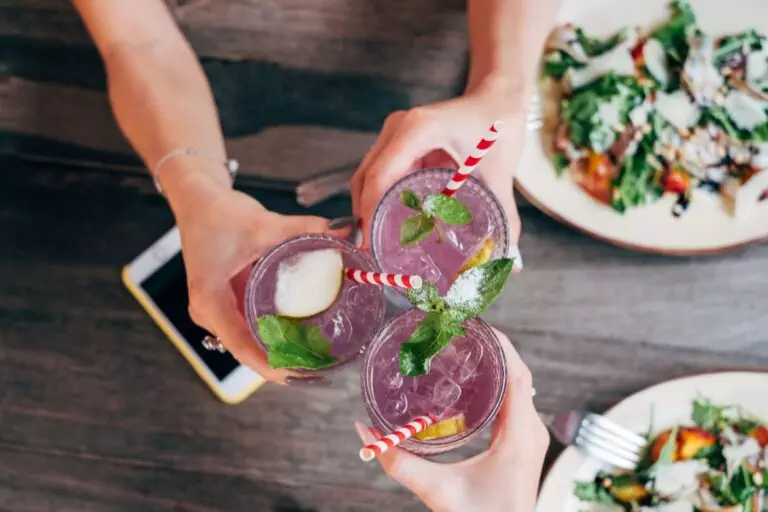In recent years, the rise of zero-alcohol products has become hard to ignore. From supermarket aisles to upscale bars, these beverages are becoming the go-to choice for many seeking an alternative to traditional alcoholic drinks.
But as these products become more commonplace, a significant question emerges: Are the zero-alcoholic alternatives suitable for everyone, especially those navigating their recovery journeys?
Drawing on Maui Recovery’s extensive experience with alcohol addiction treatment, we’ll address this issue – exploring the potential benefits and pitfalls of these beverages in the context of recovery.
What are zero-alcohol products?
Zero-alcohol products (ZAPs) are drinks that mimic the taste, aroma, and mouthfeel of alcoholic beverages but contain little to no alcohol. Commonly, they have less than 0.5% alcohol by volume (ABV) and claim to offer a similar sensory experience to traditional alcoholic drinks without the intoxicating effects of alcohol. Popular types include beers, wines, and spirits.
Another common definition is “NoLo”. These are alcoholic beverages (such as beer, spirits, wine, and cocktails) that are produced with ethanol completely removed or significantly reduced.
Both zero and low-alcohol drinks are especially appealing to those who want to enjoy the social aspect of drinking without the potential risks associated with alcohol consumption. Whether for health reasons, personal preferences, or being in situations where consuming alcohol isn’t appropriate, these products provide an alternative option.
The (over) promise of zero-alcohol products
Championed as the next big thing in the beverage industry, ZAPs may appear the perfect solution for those who want to lower their alcohol intake or are in recovery from alcohol addiction. For some, they offer the allure of a relaxed evening or a social gathering without the morning-after regrets or health complications often associated with overindulgence. For others, they promise to relieve a craving for alcohol without the consequences of relapse.
Furthermore, these products boast reduced health risks. By eliminating alcohol, they remove the associated health risks – liver damage, heart issues, depression & anxiety, and more. In theory, this should make them an ideal choice for those looking to enjoy the essence of a drink while prioritizing their well-being.
However, as tempting as these selling points might be, it’s essential to consider their implications. This is especially true if you’re in recovery. Despite their attractive promise, these beverages can be a double-edged sword.
How zero-alcohol products are marketed

Unsurprisingly, the marketing strategies for alcohol-free products have been under recent scrutiny, especially considering their potential target audiences.
This report from 2022 showed that brands are positioning non-alcoholic beverages for times and places where traditional alcohol isn’t typically present – think weekday lunches or post-gym refreshments.
Many alcoholic drink companies engage in “alibi marketing“. This refers to the practice of using brand features that are synonymous with alcohol, without actually advertising alcohol. Often arising in places where NoLos are regulated more leniently than alcoholic products, it can lead to more liberal promotion strategies, potentially endorsing alcohol consumption in risk-associated situations.
Despite the appeal of these products as potential aids to reduce alcohol consumption, the evidence is scant. Instead of replacing alcoholic drinks, zero-alcohol products appear to be expanding the consumer base and occasions for consumption. For instance, they’re being promoted for audiences like pregnant women, athletes, and even children.
Understanding the psychology of alcohol consumption
Recovery from alcohol addiction is complex and deeply personal. While the physical effects of alcohol are often at the forefront of discussions, the psychological dimensions of drinking shouldn’t be underestimated. For many on the path of recovery, it’s not just the substance itself that poses a challenge, but the rituals surrounding it.
Imagine the clink of glasses during a toast or the feel of a cold bottle on a hot day. These moments, though seemingly innocuous, can evoke powerful memories and feelings. The mere act of sipping a drink that tastes like alcohol, even if it’s devoid of the intoxicating effects, can rekindle the sensory associations with past drinking experiences. For some, this familiarity can awaken old habits and reignite the urge to consume actual alcohol.
Being in settings where alcohol was once a primary activity, like parties or bars, can already be triggering for some. Introducing a non-alcoholic drink that mimics the taste of alcohol might inadvertently intensify these triggers. Therefore, it’s crucial to recognize the intertwined nature of the physical and psychological aspects of addiction. If you have an issue with alcohol, were recommend approaching zero-alcohol products with a sense of caution and awareness.
How zero-alcohol drinks can blur boundaries
For those in recovery, the boundary between what is permissible and what isn’t is vital. Introducing a drink that closely resembles alcohol in taste and presentation can create a gray area. The internal debate becomes more complex: “If I can have this drink that tastes like alcohol, perhaps a small amount of the real thing wouldn’t hurt?”
This isn’t mere speculation. The World Health Organization has voiced concerns about the potential risks posed by non-alcoholic alternatives. The semblance of these drinks to their alcoholic counterparts can lead to a precarious rationalization of choices; that transitioning to actual alcoholic beverages might be a manageable step.
This line of thinking can be particularly risky, as it downplays the potential repercussions and might derail your recovery journey.
The latest data on the risks of zero-alcohol products
Currently, research is scarce on this pressing subject. To date, there have been no studies evaluating the safety or effectiveness of zero-alcohol products as an alternative for high-risk or dependent alcohol consumers. The potential of ZAPs to serve as a harm-reduction tool warrants more in-depth study.
Recently, the Australian & New Zealand Journal of Psychiatry published its review of the available. By examining prior research, investigators aimed to understand the physiological, behavioral, and social implications of these increasingly popular beverages. Here’s a breakdown of some of their findings:
Increased cravings

Evidence suggests those with alcohol use disorders might experience heightened alcohol cravings when consuming zero-alcohol products. Notably, physiological reactions, such as increased heart rate and sweating, might indicate these products act as triggers.
Limited efficacy as substitutes
Simply switching traditional alcoholic beverages with zero-alcohol alternatives doesn’t address the broader social and cultural forces driving alcohol consumption. In regions where drinking is widespread, the introduction of these products might even promote earlier alcohol initiation and elevate excessive drinking patterns.
Precautionary tips regarding ZAPs
- Understand that zero-alcohol products may act as triggers, especially among those with a history of alcohol addiction and younger audiences.
- Report any promotional content that seems to endorse alcohol-related behaviors or consumption.
- Advocate for more stringent regulatory measures that consider the nuanced marketing of NoLos. These recommendations stem from the study’s observations, hoping to inform decisions and minimize potential risks associated with zero-alcohol products.
Risks for individuals with Alcohol Use Disorder (AUD)
ZAPs, while potentially having reduced risks, are not devoid of them. Particularly, those with a history of AUD might find their alcohol cravings and physiological responses aggravated. Transitioning to ZAPs also doesn’t tackle deeper sociocultural influences encouraging alcohol consumption.
Public health implications
The rising promotion and availability of ZAPs warrant attention. Their packaging, often echoing their alcoholic analogs, forms part of “alibi marketing” strategies. This approach potentially elevates brand recognition, even among those not traditionally exposed to alcohol, such as children. Concerns arise when ZAPs seem to endorse alcohol use in scenarios or among groups where it’s usually deemed unsafe, creating a potentially misleading narrative.
The importance of individual choice in recovery
For some, these non-alcoholic beverages can be a helpful tool, letting you be part of social gatherings without the pull of alcohol. You might relish the flavor without being enticed back into old habits. Yet, for others, even a whisper of alcohol’s taste or the act of drinking can evoke powerful memories and feelings.
It’s vital for you to prioritize personal choices in your recovery. Recognizing your triggers, understanding your boundaries, and making decisions tailored to your unique journey are paramount. Whether it’s seeking advice from professionals, leaning on support groups, or taking time for self-reflection, these steps can guide your choices.
At the end of the day, your recovery is about empowering yourself to make decisions that bolster your well-being and ongoing success. The choice of whether or not to incorporate zero-alcohol products into your life is just one of them, but it merits thoughtful consideration.
Recommendations for those in recovery considering zero-alcohol products

The path to recovery is fraught with challenges, each person navigating their unique journey with different strategies and coping mechanisms. For some, zero-alcohol products might seem like a tempting bridge between their past and their present. However, before making a decision, consider the following recommendations:
Consultation first – Engage in a conversation with your recovery mentors, therapists, or support groups. Their collective experience and understanding of your personal journey can provide a fresh perspective.
Embrace self-awareness – Dive deep into understanding your triggers and emotional responses. Reflect on whether zero-alcohol products might ignite latent memories or cravings.
Establish boundaries – If you decide to try zero-alcohol products, set clear boundaries. Determine when and where you’ll consume them, and stick to those rules.
Stay informed – Educate yourself about the zero-alcohol industry. Understand the differences between various products and their intended audience.
Monitor your feelings – After trying a zero-alcohol product, gauge your emotional and psychological response. Does it evoke feelings of nostalgia, longing, or even relapse?
The goal is not to restrict but to empower you with information and support, ensuring every step you take is in harmony with your recovery goals.
How Maui Recovery can help
At Maui Recovery, we salute your brave decision to stop drinking alcohol, even if you’re considering alcohol-free alternatives. Every step taken toward a healthier lifestyle is commendable, and the road from alcohol dependence to recovery is a varied one, filled with both challenges and triumphs.
While the rise of alcohol-free products offers a new dimension to the landscape of sobriety, it’s essential to know if they’re appropriate for your recovery journey. Transitioning away from an alcohol-centric life can bring about profound changes, both physically and mentally.
We recognize that your choices, whether abstaining from alcohol entirely or exploring alcohol-free options, are deeply personal. That’s why at Maui Recovery, our holistic approach aims to meet you where you are. Our personalized treatment plans combine evidence-based treatments – such as CBT, group therapy, and mindfulness-based stress reduction (MBSR) – with exciting modalities like adventure therapy and nature immersion.
Our dedicated and passionate team stands ready to provide the support and resources you need, no matter your needs. By choosing to decline an alcoholic drink, or even opting for its alcohol-free counterpart, you’re not just removing a potential trigger – you’re creating space for better health, stronger relationships, and a rejuvenated sense of self.
For more information on Alcohol Use Disorder, feel free to read our article discussing the signs and symptoms of alcohol addiction.
If you wish to discuss this topic, our treatment options, or seek guidance on the role of alcohol-free products in recovery, please don’t hesitate to contact us. We’re here for you.









